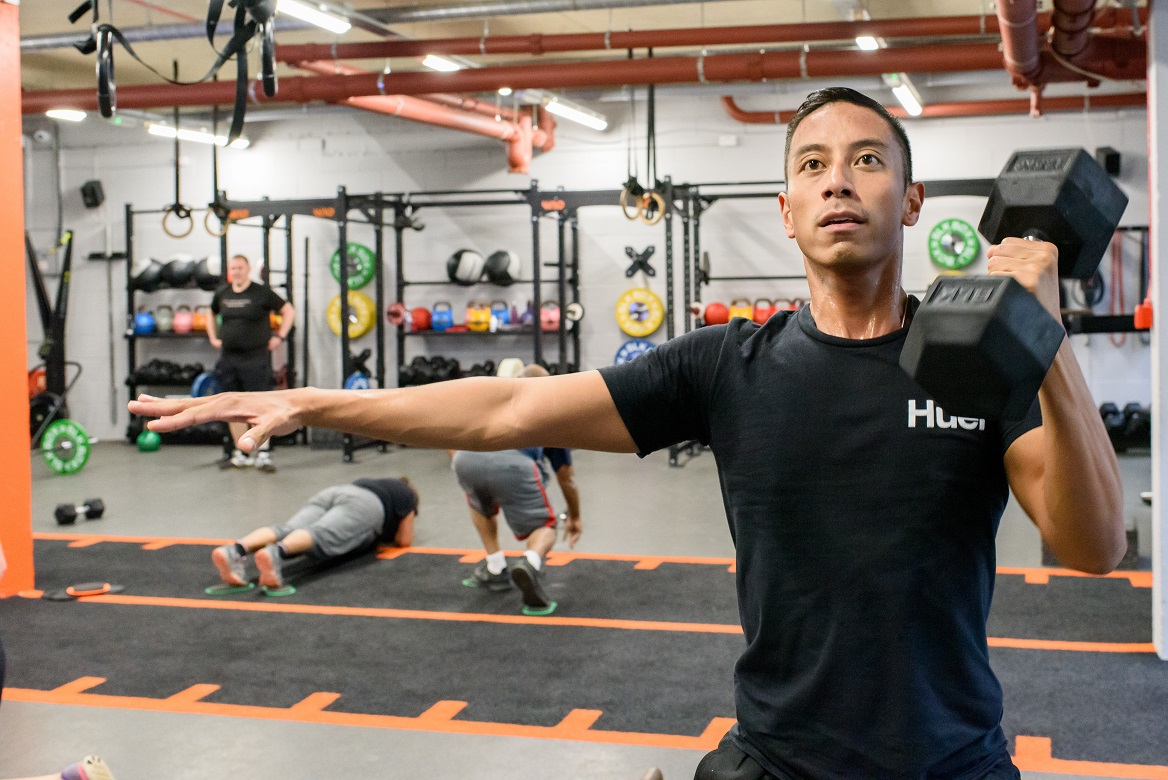
Categories
6 Priorities for Building Muscle
So, you want to build muscle. Easy! Just put yourself on a split body part training programme (you know the one, chest on Mondays, back on Tuesday’s, legs Friday/never) and eat like you’re eating for 3. Finally, when you’ve bulked up enough you just need to ‘cut’ by starving yourself and walking miles to help burn away all that fat.
When it comes to building muscle there is another way. As usual in the fitness industry, trends that began decades ago still seem to hold sway despite the overwhelming scientific evidence against these methods and/or credible alternative methods. We now know these can work just as well while looking after health needs at the same time.
6 Priorities for Muscle Building
When it comes to building muscle there is a definite hierarchy. This blog will cut through the chaff to get to the metaphorical wheat.
Priority 1 – Training Stimulus
Your diet could be perfect for building muscle, but without an appropriate training stimulus (load, set/reps, rest, tempo, etc.) you will be wasting your time.
Studies show that training is a bigger stimulus for muscle growth than nutrition. Even in severely restricted diets (very low calories – around 800/day). Strength training prevents muscle loss as long as protein makes up 40% of the total calories (so around 320 calories from protein or 80g/day).
Unless you are training every day, a split routine is not the best way forward. You will not stimulate muscle groups frequently enough. Whole-body routines ensure the body is adequately stimulated, often enough, for muscle building to take place. Our programmes cater for this perfectly. Interest to see what Foundry is all about? Test us. Test yourself. Join us for a 30-day trial.
Priority 2 – Protein
Protein (meats, fish, dairy, tofu, soy-based products) are the priority when it comes to macronutrients. There are a few things to consider here: total protein and when you eat it.
Total Protein – we all know that building muscle requires protein. So it makes sense that building ‘extra’ muscle requires a slightly higher than normal protein intake.
What we sometimes forget is that protein is actually a signaller. A threshold amount of protein needs to be consumed in order to stimulate MPS (muscle protein synthesis) or muscle building.
In fact, it is a particular Amino Acid (‘building blocks’ of proteins) – Leucine – that is the key signaller for the body to begin MPS. Therefore it’s important that you consume a certain amount of protein to ensure Leucine reaches the threshold levels to signal growth.
What does this look like in practice? Protein requirements vary depending on your body weight. To be in the ballpark for optimal intake you are probably looking between 1.8-2g of protein per kg of body weight, per day.
If you weight 75kg and aim for 2g/kg, this would equate to 150g of protein or, approximately, 5 cooked supermarket chicken breasts per day. For some, this is a lot to eat in a day. For this reason, many consume some of their protein intake in liquid form.
Timing – To keep MPS going throughout the day (assuming a regular training stimulus is present) it’s important to keep topping protein, and subsequently, Leucine, up during the day.
At least every 4 hours is a good time period to stick with and, when it comes to the evening, consume a Casein rich protein shake which will ensure a slow release during the night.
Priority 3 – Carbohydrates
When building muscle, carbohydrates are your friend. As weight training, predominantly uses glycogen (stored carbs) as an energy source, it’s important we replace these to supply the body with the energy needed to perform the work we want it to.
From a practical perspective, you need carbohydrates to make up 40-50% of your total calorie intake. Most of these should come from quality sources (rice, sweet potato, potatoes, oats, etc). Any source is good post-training. In fact, there is evidence to show that fast releasing, sugary carbs, are best in this situation. This is because levels of stored carbs will be topped up quicker and more completely, with sugary sources.
Having a source of quality carbohydrates on your plate (making up a third of the size of the dish, at least) is a great start with something sugary kept for post-training.
Priority 4 – Total Calories
This is the most complex equation to work out, especially considering you also need to consume a minimum amount of fats in your diet (usually between 0.7-1g/kg/day) to take care of hormone production needs, nervous system and immune system needs.
It is important you consume enough calories to take care of your energy requirements. However, a large surplus is not necessary. Having said that, it’s useful to have a slight calorie surplus to give your body all the energy it needs to build muscle.
Measuring calories is an inexact science (both intake and expenditure). It’s best to account for this error margin by going over rather than under.
You can always bring calories down if you find yourself putting on fat. You don’t want to sabotage your results by underfeeding and not having the energy to train hard.
Priority 5 – Supplements
Despite what you might read, there are only 2 supplements, backed by unequivocal scientific data, that help with muscle building. These are protein and creatine. We know why protein is important.
Creatine has shown it’s worth in helping increase the amount of high-intensity work we can perform during our weight training. This is important as the volume of work is one of the key drivers of MPS and so the higher intensity (i.e. heavy) lifting we can perform, the greater the stimulus.
Protein supplements are useful to help us hit our protein goals and for convenience. You can take creatine on a daily basis to help keep your stores of high-intensity energy (ATP) topped up during exercise and quickly regenerate when it’s used.
Taking 5g per day (following a 5-7 day loading period where you consume 20g/day (with 80-90g carbs) in your post-workout shake will take care of your creatine needs.
There is no need to go for anything fancy in terms of the type of creatine. In fact, creatine monohydrate is the most common supplement there is, and we know it works very well.
Priority 6 – Rest and Recovery
One of the UK’s leading Strength and Conditioning coaches, Nick Grantham, coined the phrase ‘Invisible Training’ when it comes to describing rest, and he is spot on in this assessment.
Muscle growth and any adaptations to training take place not during the session itself, but in the period following training from minutes after to 48 hours post-workout.
If your rest is poor quality (bad sleep or poor quantity sleep) or disrupted recovery (training too hard, too often) the adaptations to training won’t take place.
It doesn’t matter how good your training, nutrition or supplement regime are they will not compensate for poor rest. We often think we can survive on less and less sleep. The question is: do you want to survive or thrive?
Putting it all together
There are many factors to consider when it comes to eating for building muscle. To help illustrate this there are 2 examples, below, that show how to put all the pieces of the jigsaw together:
Male (45yrs) – 175cm tall, 80kg
Using a standardised equation, this person would require 1664 calories to survive. 2200 to balance with energy requirements (assuming 3-4 training sessions a week) and 2600 calories to put them into a 20% surplus which would be reasonable for muscle gain.
- Protein – 170g per day
- Carbohydrates – 300g per day
- Fats – 80g per day
Female (45yrs) – 165cm tall, 65kg
Using a standardised equation, this person would require 1295 calories to survive. 1684 to balance with energy requirements (assuming 3-4 training sessions a week) and 2000 calories to put them into a 20% surplus which would be reasonable for muscle gain.
- Protein – 130g per day
- Carbohydrates – 225g per day
- Fats – 64g per day
Monitor your measurements
Our gym members receive monthly reviews where goals are set, assessed, processes put in place and diets determined and reviewed.
It is important to monitor objective measurements, such as weight, body fat, muscle weight to ensure that the desired effect is achieved, and fat/weight levels don’t creep up unnecessarily.
The InBody machine we use can measure all these variables and help determine any changes that may need to be made to training and nutrition plans to help keep you on track.
To conclude once you align all 6 priorities (training stimulus, protein, carbohydrates, total calories, supplements, and recovery) for what is best for you then you can really get a handle on your muscle-building journey to reach your desired goals.
If you have any questions on the above or would like some advice on how we could help you with your fitness goal, don’t hesitate, visit our gym and try one of our personal training programmes.
Related Articles
- Put Your Mind in Your Muscle
- 15 Ways Increased Muscle Mass Improves Metabolism
- Vitamin D For Fat Loss And Gaining Muscle
- Enhance Your Training Results with the Cardiac Output Method
- Why You Should Focus on Full Body Workouts


